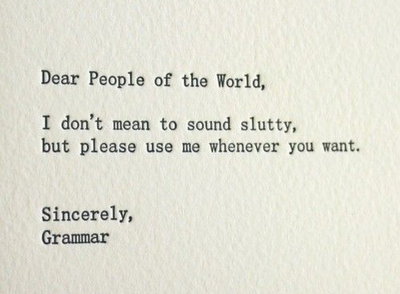By the time you get to college, professors generally assume you learned all you need to know about grammar in high school.
You would probably be surprised by the amount of basic grammar skills that either aren't absorbed or are forgotten. I'm not.
Obviously print journalists rely heavily on their grammar skills as they're tasked with telling stories using only words. But broadcast journalists aren't exempt from having good grammar ... or at least they shouldn't be.
Speaking conversationally doesn't mean you can dip into street slang or local dialect. In fact, both of those things detract from your credibility. Why should someone listen to and/or trust a person who doesn't speak correctly?
Unfortunately, most colleges don't require or even offer a grammar class for journalism students. The closest thing I got was an advanced editing and reporting class I took for my print major. Broadcast students weren't required to take those because they focused mostly on print-related things. However, in this day and age, can we truly separate ourselves that way? Yes, I work in broadcast, but I still have to know how to write, and I post stories to our website in PRINT format. And more and more print journalists are being required to turn broadcast-type stories for their online versions.
Is there a difference in the writing styles? Absolutely. But the same rules of grammar apply to both.
In the four years I've been working in this field, I've seen a lot of grammatical issues -- some over and over again. Here are the three I correct on a daily basis: Which versus That; Then versus Than; and Affect versus Effect. It's also not uncommon for me to correct misused apostrophes and commas; hyphens seem to be either not used at all or in all the wrong places; and, unfortunately, I still see subject-verb disagreement on occasion.
Probably the biggest concept for aspiring journalists to learn, whether they want to work for a newspaper or in television, is to write in active voice over passive voice. Using passive voice is not grammatically wrong, but it lends a slower pace to the story. Things are acted upon instead of your characters, if you will, performing some type of action. To put it bluntly, passive voice is boring and doesn't invite your readers or viewers to finish the story.
There is no easy way to overcome the grammar learning curve. I've actually considered putting together a pocket guide for grammar or launching a series on here. Honestly, though, who has the time? It would be a never-ending, miles-long project that would surely drive me insane.
So I guess the best advice I can offer you is to get an AP Stylebook if you don't already have one. It covers most of the common grammatical issues as well as some not-so-common ones. If you want to go the extra mile, pick up a copy of Working With Words.
In this business, words are your business. To make it, you've got to be well-equipped.
- Home
- About Me
- Read With Me
- _2026 Book Club
- _My Favorite Books
- _My Reviews & Recs
- _My TBR
- _Spring Reading List
- _Summer Reading List
- _Fall Reading List
- _Winter Reading List
- _2025 Book Club
- _2024 Book Club
- _2023 Book Club
- _Book Club Reviews
- Outfits
- _Real Outfits
- _Teacher Style
- _Spring Style
- _Summer Style
- _Fall Style
- _Winter Style
- _What To Wear
- Shop
- _Gift Guides
- _My Favorite Things
- _LTK Shop
- _Shop My Instagram
- _Shop My Pinterest
- _Wish Lists
- Get Social
- _Facebook
- _Instagram
- _Pinterest
- _TikTok
- Subscribe
















i NEED to get that AP Stylebook. i am not a great writer. i make mistakes! ugh!
ReplyDeletefyi i just met with a new vendor that is going to quote on a new alarm system for our gallery. he kept saying stuff like, "i didn't have to do nothing!" omfg! i didn't want to be a jerk and correct him, but if my BOSS had heard how this man spoke, he would NEVER agree to give him the job!
We interview people like that all the time. It's difficult finding bytes where they don't sound ignorant, but heaven forbid if you decide not to use them.
DeleteHi, Ashton! You are part of the solution and I applaud you. Having watched, studied and worked in television news for more than 50 years I have witnessed drastic changes, few of them for the better. Your piece brings to mind the late network newscaster Edwin Newman who was a champion of good grammar. In addition to lecturing on the subject, Newman wrote a book entitled Strictly Speaking: Will America Be the Death of English? Part of the book description reads as follows: << Newman focuses on the sorry state of the English language as a reflection of the sorry state of the society. He skewers stereotypes, clichés, errors, and jargon used by weather forecasters, presidents, vice-presidents, sportscasters, diplomats, senators, pollsters, convention nominators, corporation executives, newsmen, advertisers, Watergate defendants, social scientists, college presidents, foreign correspondents, youth. If words are devalued, he argues, so are ideas and so are human beings. He deflates the pompous, the grandiose, the stilted, and the hollow. He rejoices in language that is lucid, graceful, direct, civilized. >> What's shocking is the fact that the book was published in 1974! The situation is far worse today, 40 years later.
ReplyDeleteI cringe when anchors and reporters on my local stations use urban slang in an effort to seem hip, cool and street smart. It diminishes them and the station they represent and it's a tune out factor for serious followers of the news who simply want it delivered by professionals.
Unless it's absolutely necessary for the story, I refuse to allow slang in my newscast. It kills the integrity of my show.
Delete